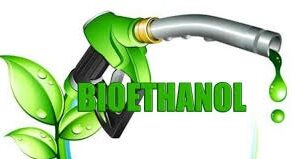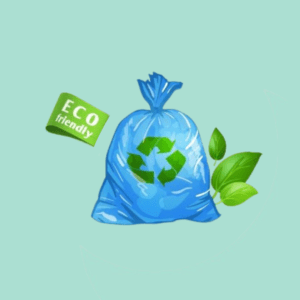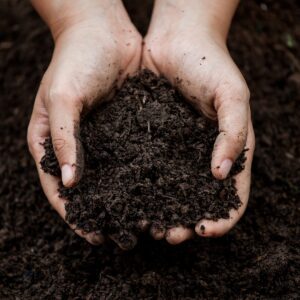Description
Vermicompost, also known as worm castings or worm humus, is a nutrient- rich organic fertilizer produced from the controlled decomposition of organic waste materials by earthworms.
IMPORTANCE
SOIL CONDITIONING
VERMICOMPOST ENHANCES SOIL STRUCTURE, IMPROVES AERATION, AND PROMOTES WATER RETENTION. ITS RICH ORGANIC CONTENT ENHANCES NUTRIENT RETENTION, MAKING IT AN IDEAL SOIL CONDITIONER, PARTICULARLY IN DEPLETED OR INFERTILE SOILS.
NUTRIENT AVAILABILITY
Vermicompost contains essential plant nutrients, including nitrogen (N), phosphorus (P), potassium (K), and various micronutrients. These nutrients are released slowly and are readily available to plants, promoting healthy growth, flowering, and fruit production.
BENEFICIAL MICRO ORGANISMS
Vermicompost is teeming with beneficial microorganisms, such as bacteria, fungi, and actinomycetes. These organisms assist in nutrient cycling, disease suppression, and improving soil fertility.
REDUCED ENVIRONMENTAL IMPACT
Vermicomposting helps minimize waste sent to landfills while reducing greenhouse gas emissions associated with organic waste decomposition. It is a sustainable waste management solution, reducing the need for chemical fertilizers.
APPLICATIONS
AGRICULTURE
VERMICOMPOST CAN BE USED AS A SOIL AMENDMENT FOR FIELD CROPS, VEGETABLES, FRUITS, AND ORNAMENTAL PLANTS. IT ENHANCES PLANT GROWTH, INCREASES RESISTANCE TO DISEASES AND PESTS, AND IMPROVES OVERALL SOIL HEALTH.
GARDENING
VERMICOMPOST IS AN EXCELLENT ADDITION TO POTTING MIXES, SEED STARTING MEDIA, AND RAISED BEDS. ITS HIGH-QUALITY NUTRIENTS PROMOTE HEALTHY ROOT DEVELOPMENT, DISEASE SUPPRESSION, AND PRODUCTIVITY IN HOME GARDENS.
LANDSCAPING
VERMICOMPOST CAN BE USED AS A TOP DRESSING OR INCORPORATED INTO THE SOIL TO IMPROVE THE HEALTH OF LAWNS, TURFGRASS, TREES, AND SHRUBS. ITS ORGANIC COMPOUNDS STIMULATE BENEFICIAL MICROBIAL ACTIVITIES, LEADING TO A MORE VIBRANT AND RESILIENT LANDSCAPE.
HYDROPONICS AND AQUAPONICS
VERMICOMPOST CAN BE USED AS A NUTRIENT SOURCE IN SOILLESS CULTIVATION SYSTEMS. IT PROVIDES A BALANCED NUTRIENT PROFILE AND IMPROVES MICROBIAL DIVERSITY IN THESE CONTROLLED ENVIRONMENTS.
TYPES AND SPECIFICATION
HOME MADE VERMICOMPOST
Produced on a small scale, typically in home worm bins. Specifications may vary depending on the feedstock used and the species of earthworms. Mature homemade vermicompost should have a neutral pH (around 7), a dark color, a pleasant earthy odor, and an absence of contaminants.
COMMERCIAL VERMICOMPOST
Produced in large-scale operations, often under controlled conditions. Specifications may include nutrient content analysis, moisture content, pH level, cation exchange capacity (CEC), and absence of pathogens and heavy metals. Commercial vermicompost is typically available in granular or powdered form.
SPECIALTY VERMICOMPOST
Includes specialty blends or formulations tailored for specific plants or applications. Specific amendments, such as additional nutrients or beneficial microorganisms, may be added to enhance the targeted benefits of vermicompost.
LIQUID VERMICOMPOST EXTRACT
A liquid concentrate derived from vermicompost, usually used as a foliar spray or fertilizer for hydroponics and aquaponics systems. Specifications may include nutrient concentration, microbial content, and compatibility with irrigation systems.
CONCLUSION
In conclusion, vermicompost is a valuable organic fertilizer produced through the impressive digestive processes of earthworms. Its significance lies in its ability to enhance soil health, improve nutrient availability, and promote sustainable agricultural practices. Understanding its applications and specifications empowers us to maximize the benefits of using vermicompost in various settings, including agriculture, gardening, landscaping, and specialized cultivation systems.





